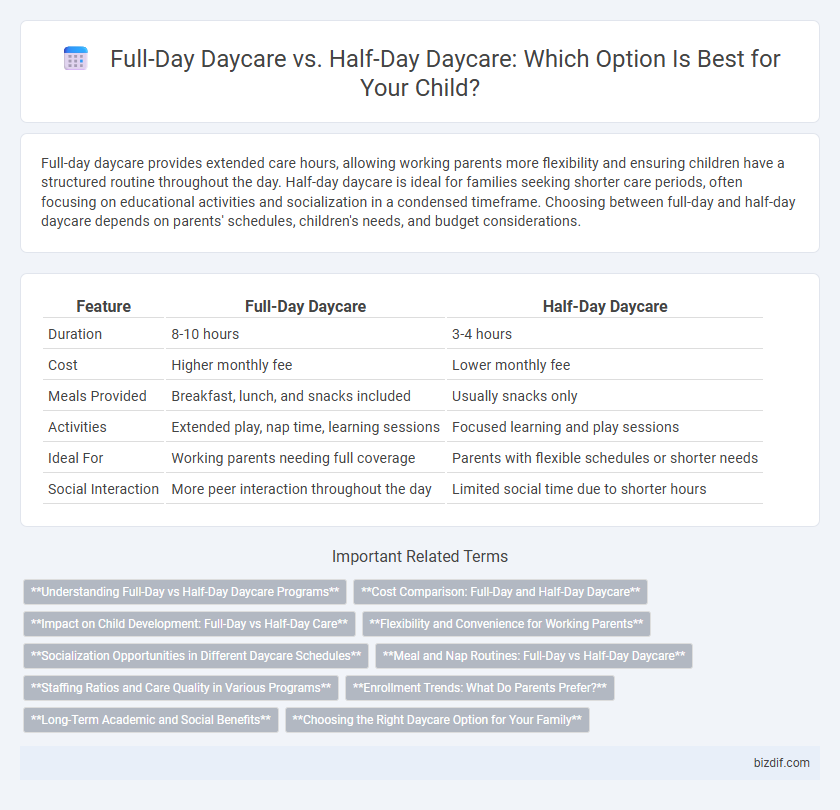Full-day daycare provides extended care hours, allowing working parents more flexibility and ensuring children have a structured routine throughout the day. Half-day daycare is ideal for families seeking shorter care periods, often focusing on educational activities and socialization in a condensed timeframe. Choosing between full-day and half-day daycare depends on parents' schedules, children's needs, and budget considerations.
Table of Comparison
| Feature | Full-Day Daycare | Half-Day Daycare |
|---|---|---|
| Duration | 8-10 hours | 3-4 hours |
| Cost | Higher monthly fee | Lower monthly fee |
| Meals Provided | Breakfast, lunch, and snacks included | Usually snacks only |
| Activities | Extended play, nap time, learning sessions | Focused learning and play sessions |
| Ideal For | Working parents needing full coverage | Parents with flexible schedules or shorter needs |
| Social Interaction | More peer interaction throughout the day | Limited social time due to shorter hours |
Understanding Full-Day vs Half-Day Daycare Programs
Full-day daycare programs typically operate for 8 to 10 hours, providing extended care that supports working parents with flexible schedules and comprehensive child development activities. Half-day daycare usually lasts 3 to 5 hours, focusing on structured learning and socialization within a shorter timeframe, often suitable for toddlers or preschoolers. Choosing between full-day and half-day programs depends on family needs, budget considerations, and the child's routine preferences.
Cost Comparison: Full-Day and Half-Day Daycare
Full-day daycare typically costs 50% to 100% more than half-day options due to extended care hours and additional services such as meals and nap times. On average, full-day programs range from $200 to $400 per week, while half-day programs are priced between $100 and $250 per week, depending on location and facility quality. Families seeking budget-friendly childcare often prefer half-day options, but full-day daycare offers greater convenience for working parents needing longer coverage.
Impact on Child Development: Full-Day vs Half-Day Care
Full-day daycare offers extended opportunities for social interaction, cognitive stimulation, and routine establishment, which can enhance language acquisition, emotional regulation, and problem-solving skills in young children. Half-day programs may provide a more focused, less overwhelming environment that supports children's adjustment and concentration during crucial early learning phases. Research indicates that while both models contribute positively to development, full-day care tends to better support school readiness and social competence due to increased exposure and diverse activities.
Flexibility and Convenience for Working Parents
Full-day daycare offers extended hours that align with typical work schedules, providing parents with consistent care throughout the entire workday. Half-day daycare programs cater to parents seeking more flexible, part-time options, often allowing for easier coordination with non-traditional or remote work hours. Choosing between full-day and half-day daycare depends on the family's work patterns and the child's individual needs, influencing daily routines and overall convenience.
Socialization Opportunities in Different Daycare Schedules
Full-day daycare programs offer extended interaction periods that foster stronger social bonds and cooperative play among children, promoting advanced communication and conflict-resolution skills. Half-day daycare schedules may limit these socialization opportunities, focusing more on individualized activities and brief group engagement. Research indicates that children in full-day settings often exhibit enhanced peer relationships and adaptability in social environments compared to half-day attendees.
Meal and Nap Routines: Full-Day vs Half-Day Daycare
Full-day daycare programs typically include structured meal and nap routines, providing children with breakfast, lunch, snacks, and designated nap times that promote consistent energy levels and overall well-being. In contrast, half-day daycare often offers limited or no meal services and shorter or no nap periods, requiring parents to manage these routines separately. Meal and nap schedules in full-day settings are designed to support early childhood development and accommodate longer attendance hours.
Staffing Ratios and Care Quality in Various Programs
Full-day daycare programs typically maintain lower staffing ratios, with one caregiver for every 6 to 8 children, enhancing individualized attention and care quality compared to half-day programs that may have one caregiver for every 8 to 10 children. Research indicates that lower child-to-staff ratios are directly associated with better developmental outcomes and increased safety in full-day daycare settings. Higher staff presence in full-day programs allows for more structured routines and personalized interactions, supporting cognitive and social growth more effectively than half-day care.
Enrollment Trends: What Do Parents Prefer?
Recent enrollment trends reveal a growing preference among parents for full-day daycare programs due to the need for extended childcare hours that accommodate busy work schedules. Data indicates that full-day daycare enrollment has increased by approximately 25% over the past five years, surpassing half-day attendance rates. Parents prioritize full-day care for its comprehensive developmental activities and consistent supervision, making it a favored choice over half-day options.
Long-Term Academic and Social Benefits
Full-day daycare programs provide children with extended opportunities for social interaction and structured learning, fostering stronger cognitive development and better school readiness compared to half-day options. Research indicates that children in full-day care demonstrate improved language skills, higher attention spans, and more positive peer relationships, which contribute to long-term academic success. Consistent exposure to diverse activities and environments in full-day daycare supports emotional regulation and teamwork skills crucial for future educational achievement.
Choosing the Right Daycare Option for Your Family
Choosing the right daycare option for your family depends on your child's daily routine and your work schedule, with full-day daycare offering extended care typically from 7 AM to 6 PM, while half-day programs provide flexible, shorter sessions usually lasting 3 to 4 hours. Full-day daycare supports consistent socialization and structured learning activities, ideal for working parents needing comprehensive coverage, whereas half-day daycare can accommodate children with lighter schedules or families seeking more budget-friendly options. Evaluating factors such as program curriculum, staff qualifications, and the child's temperament ensures a balanced choice that promotes development and fits your household needs.
Full-day daycare vs half-day daycare Infographic

 bizdif.com
bizdif.com